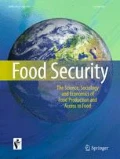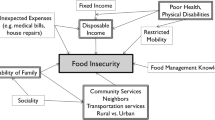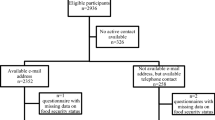Abstract
Literature is scarce on food insecurity in the context of different illnesses and intersecting social hierarchies of gender and ethnicity. This study aims to describe and compare the prevalence of food insecurity between immigrants and natives in Portugal and explore social determinants of poor health outcomes associated with food insecurity. Data were derived from the National Food, Nutrition and Physical Activity Survey 2015–2016, which is a national and regionally representative survey of the Portuguese general population which collected nationwide data on dietary habits (including food insecurity measured by the Radimer/Cornell food security questionnaire) and physical activity, among other dimensions. Demographic, socioeconomic and health factors that could help explain ethnic disparities in food insecurity were explored through complex survey data analysis. The prevalence of food insecurity was 10.7% (95% CI: 6.5–15.0) among immigrants and 10.1% (95% CI: 8.3–11.9) among natives; no significant differences were found. Low family income and low level of education were the main factors associated with food insecurity in Portugal, in both native and immigrant groups. Self-reported diseases and poor self-rated health were also associated with food insecurity. Only among natives, women, older and unmarried subjects had higher food insecurity. Therefore, inter-sectoral policies addressing the social determinants of food insecurity are needed to reduce social inequalities and particular attention should be given for Portuguese women, elderly and unmarried people which are the most vulnerable groups. Promoting equality in household food and nutrition security in Portugal including among immigrant’s populations is a public health priority.
Similar content being viewed by others
Abbreviations
- BMI:
-
Body Mass Index
- CI:
-
Confidence interval
- ERS/USDA:
-
Economic Research Service of the United States Department of Agriculture
- IAN-AF:
-
National Food, Nutrition and Physical Activity Survey
- INSA:
-
National Health Institute Doutor Ricardo Jorge
- NHANES:
-
National Health and Nutrition Examination Survey
- NUTS II:
-
Nomenclature of territorial units for statistics; OR, Odds ratio.
References
Agyemang, C. (2019). Comfy zone hypotheses in migrant health research: Time for a paradigm shift. Public Health, 172, 108–115.
Alvares, L., & Amaral, T. F. (2014). Food insecurity and associated factors in the Portuguese population. Food and Nutrition Bulletin, 35(4), 395–402.
Baćak, V., & Ólafsdóttir, S. (2017). Gender and validity of self-rated health in nineteen European countries. Scandinavian Journal of Public Health, 45(6), 647–653.
Bickel G, Nord M, Price C, Hamilton W, Cook J. Measuring Food Security in the United States: Guide to Measuring Household Food Security - Revised 2000, Virginia: USDA, 2000.
Carballo, M. (2006). The challenge of migration and health. World Hospitals and Health Services, 42(4), 18–19.
Costa, L., Dias, S., & Martins, M. (2018). Fruit and vegetable consumption among immigrants in Portugal: A Nationwide cross-sectional study. International Journal of Environmental Research and Public Health, 15, 2299.
DeSalvo, K. B., Fan, V. S., McDonell, M. B., & Fihn, S. D. (2005). Predicting mortality and healthcare utilization with a single question. Health Services Research, 40(4), 1234–1246.
Dias, C. M., Paixão, E., Branco, M. J., & Falcão, J. M. (2008). The health of immigrants - National Health Survey 2005–2006 | a saúde dos imigrantes - Inquérito Nacional de Saúde 2005–2006. Ricardo Jorge IP: Lisb Dep Epidemiol Inst Nac Saúde Dr http://hdl.handle.net/10400.18/267 (Portuguese).
Dinour, L. M., Bergen, D., & Yeh, M. C. (2007). The food insecurity-obesity paradox: A review of the literature and the role food stamps may play. Journal of the American Dietetic Association, 107(11), 1952–1961.
Fernandes, S. G., Rodrigues, A. M., Nunes, C., Santos, O., Gregório, M. J., de Sousa, R. D., Dias, S., et al. (2018). Food insecurity in older adults: Results from the epidemiology of chronic diseases cohort study 3. Frontiers in Medicine, 5, 203.
Ford, E. S. (2013). Food security and cardiovascular disease risk among adults in the United States: Findings from the National Health and nutrition examination survey, 2003-2008. Preventing Chronic Disease, 10, E202.
Franklin, B., Jones, A., Love, D., Puckett, S., Macklin, J., & White-Means, S. (2012). Exploring mediators of food insecurity and obesity: A review of recent literature. Journal of Community Health, 37(1), 253–264.
Gilbert, P. A., & Khokhar, S. (2008). Changing dietary habits of ethnic groups in Europe and implications for health. Nutrition Reviews, 66(4), 203–215.
Glenday, K., Kumar, B. N., Tverdal, A., & Meyer, H. E. (2006). Cardiovascular disease risk factors among five major ethnic groups in Oslo, Norway: The Oslo immigrant health study. European Journal of Cardiovascular Prevention and Rehabilitation, 13(3), 348–355.
Goulão, B., Santos, O., Alarcão, V., Portugal, R., Carreira, M., & Do, C. I. (2015). Overweight prevalence in Brazilian and African immigrants living in Portugal | Prevalência de excesso de peso nos imigrantes brasileiros e africanos residentes em Portugal. Rev Port Saude Publica., 33(1), 24–32.
Gregório, M. J., Rodrigues, A. M., Graça, P., de Sousa, R. D., Dias, S. S., Branco, J. C., & Canhão, H. (2018). Food insecurity is associated with low adherence to the Mediterranean diet and adverse health conditions in Portuguese adults. Frontiers in Public Health, 6, 38.
Heflin, C. M., Siefert, K., & Williams, D. R. (2005). Food insufficiency and women’s mental health: Findings from a 3-year panel of welfare recipients. Social Science & Medicine, 61(9), 1971–1982.
Ingleby, D. (2012). Ethnicity, migration and the “social determinants of health” agenda. Psychosocial Intervention, 21(3), 331–341.
Kennedy, S., Kidd, M. P., McDonald, J. T., & Biddle, N. (2015). The healthy immigrant effect: Patterns and evidence from four countries. Journal of International Migration and Integration, 16(2), 317–332.
Kersey, M. A., Beran, M. S., McGovern, P. G., Biros, M. H., & Lurie, N. (1999). The prevalence and effects of hunger in an emergency department patient population. Academic Emergency Medicine, 6(11), 1109–1114.
Kirkpatrick, S. I., Dodd, K. W., Parsons, R., Ng, C., Garriguet, D., & Tarasuk, V. (2015). Household food insecurity is a stronger marker of adequacy of nutrient intakes among Canadian compared to American youth and adults. The Journal of Nutrition., 145(7), 1596–1603.
Kumar, B. N., Meyer, H. E., Wandel, M., Dalen, I., & Holmboe-Ottesen, G. (2006). Ethnic differences in obesity among immigrants from developing countries, in Oslo. Norway. Int J Obes., 30(4), 684–690.
Kushel, M. B., Gupta, R., Gee, L., & Haas, J. S. (2006). Housing instability and food insecurity as barriers to health care among low-income Americans. Journal of General Internal Medicine, 21(1), 71–77.
Laraia, B. A. (2012). Food insecurity and chronic disease. Advances in Nutrition, 4, 203–212.
Lopes, C., Torres, D., Oliveira, A., Severo, M., Guiomar, S., Alarcão, V., et al. (2018). National Food, nutrition and physical activity survey of the Portuguese general population, 2015-2016: Design and methods. JMIR Res Protoc., 7(2), e42.
Mahmoodi, M. R., Najafipour, H., Mohsenpour, M. A., & Amiri, M. (2017). The relationship between food insecurity with cardiovascular risk markers and metabolic syndrome components in patients with diabetes: A population-based study from Kerman coronary artery disease risk study. Journal of Research in Medical Sciences : The Official Journal of Isfahan University of Medical Sciences, 22, 118.
Myers, A. M., & Painter, M. A. (2017). Food insecurity in the United States of America: An examination of race/ethnicity and nativity. Food Sec., 9, 1419.
Ngo, J., Gurinovic, M., Frost-Andersen, L., & Serra-Majem, L. (2009). How dietary intake methodology is adapted for use in European immigrant population groups – A review. The British Journal of Nutrition, 101(S2), S86.
Osei-Kwasi, H. A., Nicolaou, M., Powell, K., Terragni, L., Maes, L., Stronks, K., et al. (2016). Systematic mapping review of the factors influencing dietary behavior in ethnic minority groups living in Europe: A DEDIPAC study. International Journal of Behavioral Nutrition and Physical Activity, 13(1), 85.
Pais-Ribeiro J. [The important is health: adaptation study of an instrument to assess health status perception]. Lisboa,PT: Fundação Merck; 2005. ISBN 972–99744–0-3 (Portuguese).
Pan, L., Sherry, B., Njai, R., & Blanck, H. M. (2012). Food insecurity is associated with obesity among US adults in 12 states. Journal of the Academy of Nutrition and Dietetics, 112(9), 1403–1409.
Peralta da Costa, L., Ferreira Dias, S., & do Rosário Oliveira Martins, M. (2017). Association between length of residence and overweight among adult immigrants in Portugal: A nationwide cross-sectional study. BMC Public Health, 17(316), 1–10.
Pruitt, S. L., Leonard, T., Xuan, L., Amory, R., Higashi, R. T., Nguyen, O. K., et al. (2016). Who is food insecure? Implications for targeted recruitment and outreach, National Health and nutrition examination survey, 2005-2010. Preventing Chronic Disease, 13, E143.
Radimer, K., Olson, C., & Campbell, C. (1990). Development of indicators to assess hunger. Journal of Nutrition, 120(Suppl 11), 1544–1548.
Rechel, B., Mladovsky, P., & Devillé, W. (2012). Monitoring migrant health in Europe: A narrative review of data collection practices. Health Policy, 105(1), 10–16.
Sanou, D., O’Reilly, E., Ngnie-Teta, I., Batal, M., Mondain, N., Andrew, C., et al. (2014). Acculturation and nutritional health of immigrants in Canada: A scoping review. Journal of Immigrant and Minority Health, 16(1), 24–34.
Schroeder K, Smaldone A. Food Insecurity: A Concept Analysis. Nurse Forum. 2015;50(4).
Seligman, H. K., Bindman, A. B., Vittinghoff, E., Kanaya, A. M., & Kushel, M. B. (2007). Food insecurity is associated with diabetes mellitus: Results from the National Health Examination and nutrition examination survey (NHANES) 1999-2002. Journal of General Internal Medicine, 22(7), 1018–1023.
Siefert, K., Heflin, C. M., Corcoran, M. E., & Williams, D. R. (2004). Food insufficiency and physical and mental health in a longitudinal survey of welfare recipients. Journal of Health and Social Behavior, 45(2), 171–186.
Spallek, J., Zeeb, H., & Razum, O. (2011). What do we have to know from migrants' past exposures to understand their health status? A life course approach. Emerging Themes in Epidemiology, 8(1), 6.
Vaccaro, J. A., & Huffman, F. G. (2017). Sex and Race/Ethnic Disparities in Food Security and Chronic Diseases in U.S. Older Adults. Gerontology and Geriatric Medicine, 3, 233372141771834.
Vozoris, N. T., & Tarasuk, V. S. (2003). Household food insufficiency is associated with poorer health. The Journal of Nutrition, 133(1), 120–126.
Weigel, M. M., Armijos, R. X., Racines, M., Cevallos, W., & Castro, N. P. (2016). Association of Household Food Insecurity with the mental and physical health of low-income urban Ecuadorian women with children. Journal of Environmental and Public Health, 2016, 5256084.
Weiser, S. D., Fernandes, K. A., Brandson, E. K., Lima, V. D., Anema, A., Bangsberg, D. R., et al. (2009). The association between food insecurity and mortality among HIV-infected individuals on HAART. Journal of Acquired Immune Deficiency Syndromes, 52(3), 342–349.
Whittle, H. J., Palar, K., Hufstedler, L. L., Seligman, H. K., Frongillo, E. A., & Weiser, S. D. (2015). Food insecurity, chronic illness, and gentrification in the San Francisco Bay Area: An example of structural violence in United States public policy. Social Science & Medicine, 143, 154–161.
Acknowledgments
This study had institutional support from the General Directorate of Health (DGS), the Regional Health Administration Departments, the Central Administration of the Health System (ACSS), and from the European Food Safety Authority (CFT/EFSA/DCM/2012/01-C03). The researchers acknowledge all these institutions and persons involved in all phases of the Survey, as well as participants.
Funding
This Survey has received funding from the EEA Grants Program, Public Health Initiatives (PT06 - 000088SI3).
Author information
Authors and Affiliations
Corresponding author
Ethics declarations
Ethical approval
Ethical approval was obtained from the National Commission for Data Protection, the Ethical Committee of the Institute of Public Health of the University of Porto and from the Ethical Commissions of each one of the Regional Administrations of Health. All participants were asked to provide their written informed consent according to the Ethical Principles for Medical Research involving human subjects expressed in the Declaration of Helsinki and the national legislation.
Conflict of interest
The authors declare that there are no conflicts of interest.
Rights and permissions
About this article
Cite this article
Alarcão, V., Guiomar, S., Oliveira, A. et al. Food insecurity and social determinants of health among immigrants and natives in Portugal. Food Sec. 12, 579–589 (2020). https://doi.org/10.1007/s12571-019-01001-1
Received:
Accepted:
Published:
Issue Date:
DOI: https://doi.org/10.1007/s12571-019-01001-1




